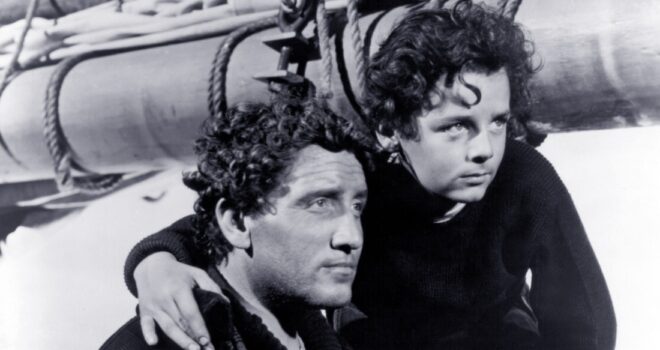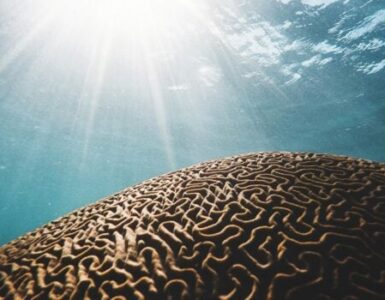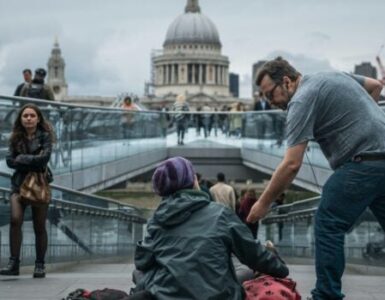Author’s Note: This article contains spoilers!
What happens when a spoiled, privileged kid is forced to spend three months working on a tiny fishing schooner? You get Captains Courageous, Victor Fleming’s moving 1937 film adaptation of Rudyard Kipling’s novel. Fleming’s classic film, set in the turbulent days of the Great Depression, is still relevant today.
Now that we’re all fully in back-to-school mode, I was struck by how the Catholic educational worldview influences this movie. Specifically, this movie presents the idea that parents are their child’s most important educator, and education is about more than textbooks.
Going Overboard
At the beginning of the movie, we meet wealthy New York City businessman Frank Burton Cheyne (Melvyn Douglas), who has the time to catch up on world news over breakfast, yet his son is an afterthought. Cheyne rushes off to work, leaving 10-year-old Harvey (Freddie Bartholomew) with a roll of bills and chauffeur transportation to boarding school. Easter vacation is over, and it’s time to return to Connecticut’s Green Hill School. Unbeknownst to Harvey and his father, this Easter will lead to a time of resurrection for them.
From the get-go, Harvey tries to hide his feelings of abandonment under a show of superiority. Harvey threatens classmates and bribes teachers to get his way. The head of the school, Dr. Finley, finally approaches Cheyne about his son’s behavior.
Cheyne realizes for the first time the effects of his workaholic lifestyle. Since his wife’s death, he has focused on giving Harvey material goods but has overlooked giving him the attention and care he needs.
Cheyne attempts to throw back the character-building responsibility on the school, but Dr. Finley stands firm. Harvey is temporarily suspended, and Cheyne has to shoulder the responsibility of shaping his son’s character during the coming months. In this moment, Harvey doesn’t need schoolteachers. He needs a dad.
Cheyne travels overseas for business and brings Harvey on an ocean liner for some father-son time. Harvey is eager to spend time with his father, but Cheyne is constantly interrupted by work. Things go from bad to worse. When Harvey bosses around some kids and gets into trouble, he tries hiding on the open deck—and falls overboard!
Manuel Fidello (Spencer Tracy), a Portuguese fisherman, is in the right place at the right time to notice Harvey drowning. He rows Harvey back to a fishing schooner. “I bring you new kind of fish,” chuckles Manuel to the sailors.
When Harvey comes to, Captain Disko Troop explains that they will be at sea for three months, until they deliver a load of fish to Gloucester. Harvey is stranded.
At first, Harvey refuses to pull his weight on board. Besides annoying the fishermen to no end, this also makes them nervous. According to sailor superstition, those who don’t work on board are “Jonahs,” bound to bring disaster down on their heads.
The captain insists that Manuel convince Harvey to do his part while he’s on board. Reluctantly, Manuel has no choice but to agree. Harvey, for his part, looks down on Manuel.
Not a promising start to the voyage.
Even so, as Harvey grows more open to putting in hard work, he also learns valuable lessons about honesty and selflessness. We can also recognize the value of living virtuously and weathering storms courageously.
Finding Your Sea Legs
Harvey’s first lesson is to take pride in his work. At first, he refuses to do even a simple task like throwing a bucket of fishbones overboard. However, as he grows bored, Harvey also becomes interested in the sense of community that binds the fishermen through their daily tasks. Harvey has always felt isolated and wants to have that feeling of community, but he’s unable to.
“You want to do just what you want to do,” Manuel diagnoses his problem. “You go below in galley…carry slops…sweat in galley…before you talk about being fisherman.”
Being a true fisherman means getting your hands dirty to serve others. Harvey takes up the challenge. He starts at the bottom of the ladder: clean-up duty.
Harvey tells Captain Disko’s teenage son, Dan, that fisherman’s clothing “itches.” This life of callouses and rough waters is beyond Harvey’s comfort zone. Dan’s practical response about the itchy clothing is, “Wait’ll you wear them for a little while. They’ll shrink to your tonnage.” This says a lot about the process of building virtue, a habit that we gradually grow into.
But what’s the value of the hard work that it takes to learn virtue?
In one scene, Harvey listens to Manuel play the hurdy-gurdy and improvise songs to go along with the music of the hand organ. When Harvey turns up his nose at this off-the-cuff music, Manuel explains how his father passed on this habit: “When you feel good inside, like trade wind, [the songs] just come out.”
Harvey, comparing his father to Manuel’s, says, “He didn’t do much for you. I mean, he didn’t leave you anything.”
Manuel is outraged. “He leave me this hurdy-gurdy that his grandfather leave him. He teach me how to fish, how to sail a boat. He gave me arms and hands and feet, feeling good outside, and he teach me how to feel good inside…What else a father do, huh?”
For Manuel, a father’s role is to teach his children how to live virtuously, and therefore joyfully, because that’s the only way to experience a full life. This is more valuable than material possessions and book-learning.
Of Fatherhood and Fisherman
Children seek role models, which is a fact schools don’t always understand. This is why Catholic schooling/homeschooling is important: whether they realize it or not, teachers provide examples to students by their behavior, so it’s important that students are surrounded by wise role models.
Because Harvey sees Manuel as a role model, he is more open to hearing about Manuel’s Catholic faith. Manuel explains that he always lights a candle for his late father’s soul. In seeing the respect that Manuel has for his father, Harvey is presented with the way things should be between him and his own dad. He also learns that there’s a wider community of saints that is always interceding.
While teaching Harvey how to fish, Manuel tells him about Jesus helping Peter haul in a big catch. “Why, sure they fish in heaven. What else they do? The Apostles, they all fishermen, I think,” Manuel says. “I think the Savior, He the best fisherman.”
And what did Jesus come for but to help us be “fishers of men,” leading everyone we encounter to God?
Towards the end of the movie, Manuel dies in a tragic accident, and Harvey witnesses his fearlessness in the face of death. “I go now and fish with my father,” he says to Harvey. “Manuel, he be watching you. You’ll be best fisherman ever.”
When Harvey reunites with his father, who had feared him dead, Harvey has transformed. Manuel’s influence leads Harvey straight to church. While lighting a candle for Manuel, Harvey encounters another type of father—a priest—who teaches him how to pray when he asks for guidance. When Harvey asks to be alone in the church, the priest steps back to allow Harvey to encounter his true Father before the tabernacle.
Harvey’s image of God is affected by his image of his dad, as Harvey prays, “I guess you have an awful lot of things to do.” It doesn’t help that Cheyne is slow to listen to his son. He tries to impress Harvey with promises of airplane travel and exciting adventures because he’s terrified he “threw [his opportunity] away” to be Harvey’s role model. The barrier between father and son is obvious when Harvey refuses to let Cheyne step into Manuel’s fishing boat.
Captain Disko speaks to Cheyne’s fears. “You’re still the boy’s dad, man. A boy is never too old not to need a dad. You just hold a hawser out to him. Someday he’s going to lay onto it and pull you right into his heart. And when you do get in there, you’ll find Manuel mighty satisfactory company.”
No role model or teacher could be more important than parents, and Cheyne finally commits to being that model for his son. We see Cheyne finally listening to Harvey as they tow Manuel’s dory driving home.
Significantly, the number “3” is painted on Manuel’s boat. Why three? Because Cheyne and Manuel are guiding Harvey, one from earth and the other from heaven? Or we can look at the trinity: Father, Son, and Holy Spirit.
God gives love to us so we can bring others, by His grace, to life in Him. That’s what it means to be “fishers of men.” Just as the outflowing of song is for Manuel, life’s greatest lesson is about learning to give from God’s love that dwells inside you—and this is one thing that you can’t fully learn from textbooks.
Photo from Captains Courageous. Retrieved from Rotten Tomatoes.










